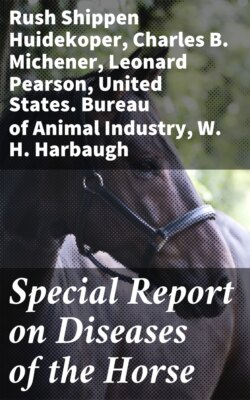Читать книгу Special Report on Diseases of the Horse - Charles B. Michener - Страница 64
На сайте Литреса книга снята с продажи.
RUPTURE OF THE LIVER.
ОглавлениеThis is known to occur at times in the horse, most frequently in old, fat horses and those that get but little exercise. Horses that have suffered from chronic liver disease for years eventually present symptoms of colic and die quite suddenly. Upon post-mortem examination we discover that the liver has ruptured. The cicatrices, or scars, that are often found upon the liver indicate that this organ may suffer small rupture and yet the horse may recover from it. This can not be the result, however, if the rent or tear is extensive, since in such cases death must quickly follow from hemorrhage, or, later, from peritonitis. Enlarged liver is particularly liable to rupture.
The immediate causes of rupture appear to be excessive muscular exertion, as leaping a fence, a fall, a blow from a collision, a kick from a horse, or sudden distention of the abdomen with gas.
The symptoms of rupture of the liver will depend upon the extent of the laceration. If slight, there will be simply the symptoms of abdominal pain, looking back to the sides, lying down, etc.; if extensive, the horse is dull and dejected, has no appetite, breathing becomes short and catching, he sighs or sobs, visible mucous membranes are pale, extremities cold, pulse fast, small, and weak or running down. Countenance now shows much distress, he sweats profusely, totters in his gait, props his legs wide apart, reels, staggers, and falls. He may get up again, but soon falls dead. The rapid running-down pulse, paleness of the eyes, nose, and mouth, sighing, stertorous breathing, tottering gait, etc., are symptoms by which we know that the animal is dying from internal hemorrhage.
Treatment.—But little can be done in the way of treatment. Opium in powder, in doses of 2 drams every two or three hours, may be given, with the idea of preventing as much as possible all movements of internal organs. If there is reason to suspect internal bleeding, we should give large and frequent doses of white-oak bark tea, dram doses of tannic or gallic acid, or the same quantity of sugar of lead, every half hour or hour. Fluid extract of ergot or tincture of the chlorid of iron, in ounce doses, may be selected. Cold water dashed upon the right side or injected into the rectum is highly spoken of as a means of checking the hemorrhage.
